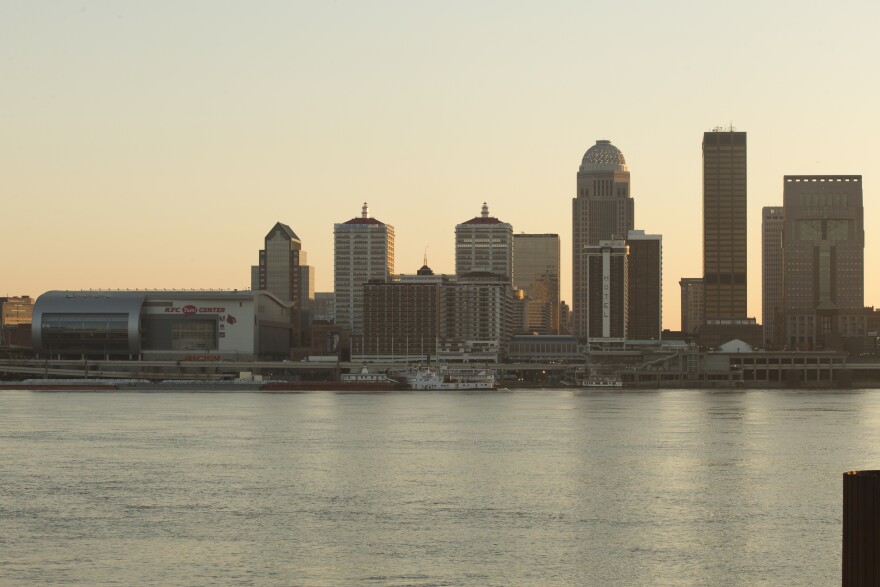Last week, to commemorate Earth Day, Louisville Mayor Greg Fischer stood in front of the Crescent Hill Library and ceremoniously signed a document committing the city to track and cut its greenhouse gas emissions. The Compact of Mayors, as it's known, is a global group of nearly 500 city leaders who are pledging to inventory their communities' emissions and prepare for the effects of climate change.
But for many of Louisville’s longtime climate activists, the sense was “been there, done that.” This isn’t the first time Fischer has signed an agreement to cut the city’s emissions, and they say the previous document has been largely ignored -- a charge a top Fischer administration official brushed off.
Louisville already has a document taking inventory of its greenhouse gas emissions and laying out recommendations to reduce them. It was prompted by another pledge: the U.S. Mayor’s Climate Protection Agreement, which was signed by former Mayor Jerry Abramson in 2005. With his signature, Abramson committed the city to reduce its greenhouse gas emissions to 7 percent below 1990 levels by 2012.
There is no data available to suggest the city has met that goal -- or even attempted to measure its progress.
In 2009, the Partnership for a Green City published the Climate Action Report. Representatives of the University of Louisville, city industries, Metro government, Jefferson County Public Schools and others worked for more than two years to prepare the report. It included a comprehensive greenhouse gas inventory that outlined where the city’s emissions were coming from — largely the transportation and residential sectors — and 175 recommendations to implement reductions.
On his second day in office — Jan. 4, 2011 — Fischer ceremoniously renewed the city’s commitment to the Climate Protection Agreement that Abramson signed six years earlier. But little has been done to live up to that agreement.
Sarah Lynn Cunningham of the Louisville Climate Action Network advised on the original report.
“Mayor Fischer did readopt the same agreement ... which we applauded,” she said. “But he has not done the follow-through that’s necessary to ensure that we met the goal, much less that we can document that we met it. So, it feels to me like we’re starting over.”
As far as Cunningham or former Air Pollution Control Director Art Williams know, the greenhouse gas inventory created in 2008 has never been acted upon. Cunningham said at this point, the document is dated and a new inventory is necessary.
Williams said he hasn't seen much interest in bringing the 175 recommendations that were part of the report to fruition during the Fischer administration.
“I’m not hopeful that there’s been any change, any new commitment developed currently,” Williams said. “Since I haven’t seen it for several years on pursuing meaningfully any of the significant important recommendations that came out of the first, very well-done study, I’m doubtful, unfortunately, that there’s been any change of heart in taking serious steps on climate change locally.”
Partnership for a Green City Director Brent Fryrear said he wasn’t sure if Louisville had met the goal laid out in the 2005 agreement — to cut greenhouse gas 7 percent from 1990 levels by 2012. But he said steps have been taken on 140 of the Climate Action Report’s 175 recommendations, though the last update in 2014 shows just eight have been completed -- like the suggestion that Metro government hire an urban forester.
“We have been working on it constantly and showing progress in a lot of the different areas,” Fryrear said. “Mayor Fischer’s commitment [to the Compact of Mayors] further solidifies the city’s desire and commitment to go forward. It’s sustainability, but it’s also in coexistence with economic development.”
Metro Sustainability Director Maria Koetter underscored the significance of the new agreement, dismissing the 2009 document as "just a report” and not a plan.
“Everybody that signs onto the compact is going to be using the same methodology do their calculations,” Koetter said. “That’s really important, to distinguish that all the cities that have signed on will be using the same protocol and methodology that will be verified and published through the same clearinghouse, so we’re all apples to apples.”
Koetter was hired by the city in 2012 and said its commitment to the U.S. Conference of Mayors happened before her tenure.
“I really can’t speak to all that,” she said. “But I’m excited to be able to take this step, and I think the city should be really proud to move forward.”
Fischer himself touted the sustainability efforts he's made during his time as mayor in an Op-Ed in the Courier-Journal earlier this week. These include creating the Sustain Louisville plan in 2013 and the recent unveiling of both the Move Louisvilleplan and the Urban Heat Island assessment.
Fischer’s budget for the next fiscal year will include funding to comply with the compact, Koetter said. The cost is expected to be $300,000 over the next three years.
But the previous greenhouse gas inventory was paid for by the city, too.
Cunningham said it’s a shame that more hasn’t been done with the Climate Action Report. And, she said, asking for volunteer participation in these projects and then not bringing them to fruition is breeding cynicism.
“Frankly, I have given up waiting for the government to follow up on those recommendations,” she said.
That’s why early next year, Cunningham and the Louisville Climate Action Network plan to open a learning center to offer educational programming for homeowners, business owners and renters interested in reducing their greenhouse gas emissions and energy bills. She said it would be called the “Center for Cutting Carbon and Cost.”





